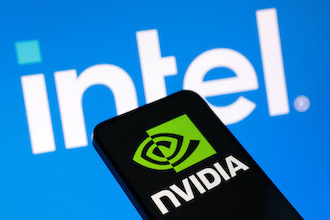Nvidia’s $5-billion investment in Intel sent the US chipmaker’s shares soaring on Thursday. But the impacts on Asian chipmakers are yet to be fully grasped.
Analysts say the move is likely to boost competition in the sector over the long term, but it could benefit TMSC – Asia’s top chipmaker – and others, if an Intel revival eases US scrutiny on foreign chipmakers.
Nvidia, now the world’s most valuable company, announced the equity investment on Thursday, which will make it one of Intel’s biggest shareholders with a roughly 4% stake. The two companies have agreed to jointly develop PC and data centre chips.
ALSO SEE: Thais Keen to Cut ‘Grey Money’, Gold Seen Lifting the Baht
The deal was welcomed warmly by Intel investors, who propelled its shares 23% on the news. Analysts expect the Nvidia partnership to help the struggling chipmaker make up some ground in artificial intelligence and boost its manufacturing capabilities.
For Taiwan’s TSMC, which accounts for an overwhelming majority of all AI chips that roll out of US companies, according to some estimates, an Intel that is chugging along is a better proposition than one that fails, analysts said.
“If Intel were to fall, it would only mean TSMC gets even more market share, leaving 90% of the burden of US semiconductor manufacturing on TSMC,” Luke Lin, a senior analyst at research firm DIGITIMES in Taiwan, said.
“Having a competitor survive is actually a good thing for TSMC, because it eases US pressure on the company. The US would have another target (Intel) to support, and that would allow TSMC to move at its own pace.”
TSMC and other Asian chip powerhouses such as South Korea’s Samsung Electronics, which contract-manufacture AI chips for their clients, are building multi-billion-dollar plants in the US, as they are under pressure from the administration of US President Donald Trump to manufacture in the US or face stiff penalties on imported chips.
That could make US chip designers even more dependent on them and attract greater attention from the government.
Asian chipmakers’ shares were by and large steady on Friday, with TSMC falling 1.6% and Samsung dropping 1%, slightly underperforming the broader market.
AMD could be hit hardest
The Nvidia deal could put Intel’s next-generation manufacturing technology on a stronger footing, helping it revive its fortunes after years of turnaround efforts failed to pay off.
Intel warned in July that it may have to get out of the chip manufacturing business if it does not land external customers to make chips in its factories.
While the new agreement will not involve Intel’s contract chip manufacturing business making computing chips for Nvidia, some investors expect their partnership could one day develop into manufacturing deals, potentially a threat to TSMC, which currently manufactures Nvidia’s flagship processors.
“Intel will eventually get its foundry business off the ground, but it will take time to build it out to scale,” Dan Nystedt, vice-president at TriOrient, an Asia-based private investment firm, said.
“Clearly, the US government wants Intel to become a manufacturer of cutting-edge semiconductors again, as a matter of national security,” he said.
Moon Joon-ho, an analyst at Samsung Securities, said the partnership is “definitely bad news for Intel’s competitors” as the deal raises the prospect of Intel improving its competitiveness and the possibility of Nvidia outsourcing chip manufacturing to Intel.
But the more immediate concern for TSMC could be a loss of business from AMD, which competes with Intel and Nvidia for supplying chips to data centres, some analysts said.
“The biggest victim will be AMD… For Nvidia, AMD is a competitor, so it is essentially pulling Intel in to fight against AMD,” Lin said, adding that TSMC’s server CPU orders from AMD may decline as a result.
TSMC and Samsung declined to comment.
An AMD spokesperson said earlier the company would keep driving market share growth with its AI-forward strategy.
How the chipmaking landscape will develop is far from clear.
“We’ll have to see how it plays out. Just putting money in doesn’t automatically make a company stronger,” Han Kyu-min, director at the Korea Fabless Industry Association, said.
“Intel needs to catch up to TSMC in terms of manufacturing capabilities. At the end of the day, whatever Nvidia develops, it still has to go to TSMC, or hopefully in the future, Samsung Foundry.”
- Reuters with additional editing by Jim Pollard
NOTE: A new image was put at the top of this report on Sept 20, 2025.
ALSO SEE:
Huang Voices Disappointment After China Bans Nvidia’s AI Chips
Nvidia’s Latest AI Chip For China Finds Few Takers
China May be Hit by Malaysia’s Move to Slow Data Centre Growth
Chinese Tech Giants ‘Want Nvidia Chips’ Despite Beijing Pushback
US Ends Chip Waiver For TSMC To Supply Its Chinese Fabs
SoftBank, Intel ‘Had Talks on Chip Unit Before $2bn Stock Deal’
US ‘Put Trackers in AI Chip Shipments to Catch Diversions to China’
Nvidia CEO Meets TSMC, in Talks With US on New China Chip
Cadence and Nvidia Dealings in China Drawing Close Scrutiny
US Unveils 100% Tariff on Imported Chips But Key Firms Exempt
China AI Firm Used Malaysian Data Centre to Beat Chip Curbs – WSJ
Server Fraud Case in Singapore May be Linked to AI Chips, China
























